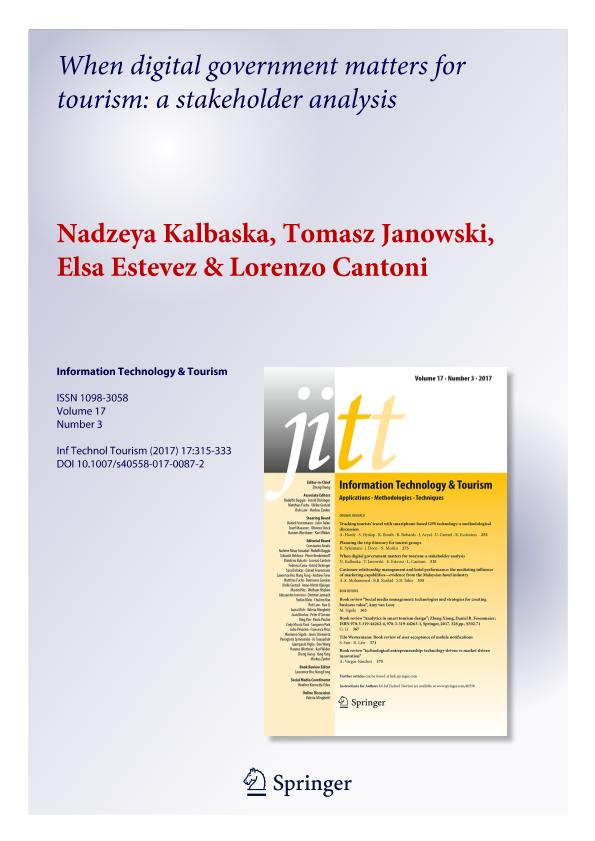Mostrar el registro sencillo del ítem
dc.contributor.author
Kalbaska, Nadzeya
dc.contributor.author
Janowski, Tomasz
dc.contributor.author
Estevez, Elsa Clara

dc.contributor.author
Cantoni, Lorenzo
dc.date.available
2018-08-15T19:56:44Z
dc.date.issued
2017-09
dc.identifier.citation
Kalbaska, Nadzeya; Janowski, Tomasz; Estevez, Elsa Clara; Cantoni, Lorenzo; When digital government matters for tourism: a stakeholder analysis; Springer; Information Technology and Tourism; 17; 3; 9-2017; 315-333
dc.identifier.issn
1098-3058
dc.identifier.uri
http://hdl.handle.net/11336/55738
dc.description.abstract
Despite the importance of governance processes for destination management and the impact of digital technology on such processes, surprisingly little academic research has explored the use of digital technology to transform public governance in the tourism sector. This conceptual paper fills this gap by conducting a digital government stakeholder analysis for the tourism sector using the digital government evolution model as its theoretical foundation. The analysis identifies six relevant stakeholder groups: governments, businesses, non-profits, citizens, visitors and employees. It examines six types of technology-enabled interactions between government and other stakeholders: government-to-government, government-to-business, government-to-non-profit, government-to-citizen, government-to-visitor and government-to-employee. These interactions are illustrated with real-life examples. The analysis contributes to identifying pressures on tourism authorities and determining how the authorities respond to such pressures, how they innovate their operations and policies with digital technologies, and how these innovations are institutionalized over time. The results contribute to building the theoretical foundations for sector-specific digital government and enable strategic discussion on the use of commercially viable and socially responsible digital innovation to advance the tourism sector.
dc.format
application/pdf
dc.language.iso
eng
dc.publisher
Springer

dc.rights
info:eu-repo/semantics/openAccess
dc.rights.uri
https://creativecommons.org/licenses/by-nc-sa/2.5/ar/
dc.subject
Digital Government
dc.subject
E-Tourism
dc.subject
Tourism
dc.subject
Tourism Governance
dc.subject.classification
Ciencias de la Computación

dc.subject.classification
Ciencias de la Computación e Información

dc.subject.classification
CIENCIAS NATURALES Y EXACTAS

dc.title
When digital government matters for tourism: a stakeholder analysis
dc.type
info:eu-repo/semantics/article
dc.type
info:ar-repo/semantics/artículo
dc.type
info:eu-repo/semantics/publishedVersion
dc.date.updated
2018-07-23T18:21:16Z
dc.identifier.eissn
1943-4294
dc.journal.volume
17
dc.journal.number
3
dc.journal.pagination
315-333
dc.journal.pais
Alemania

dc.journal.ciudad
Berlín
dc.description.fil
Fil: Kalbaska, Nadzeya. Università Della Svizzera Italiana; Suiza
dc.description.fil
Fil: Janowski, Tomasz. Gdansk Technical University of Technology; Polonia. Danube University Krems; Austria
dc.description.fil
Fil: Estevez, Elsa Clara. Consejo Nacional de Investigaciones Científicas y Técnicas. Centro Científico Tecnológico Conicet - Bahía Blanca. Instituto de Ciencias e Ingeniería de la Computación. Universidad Nacional del Sur. Departamento de Ciencias e Ingeniería de la Computación. Instituto de Ciencias e Ingeniería de la Computación; Argentina
dc.description.fil
Fil: Cantoni, Lorenzo. Università Della Svizzzera Italiana; Suiza
dc.journal.title
Information Technology and Tourism
dc.relation.alternativeid
info:eu-repo/semantics/altIdentifier/url/https://link.springer.com/article/10.1007%2Fs40558-017-0087-2
dc.relation.alternativeid
info:eu-repo/semantics/altIdentifier/doi/http://dx.doi.org/10.1007/s40558-017-0087-2
Archivos asociados
